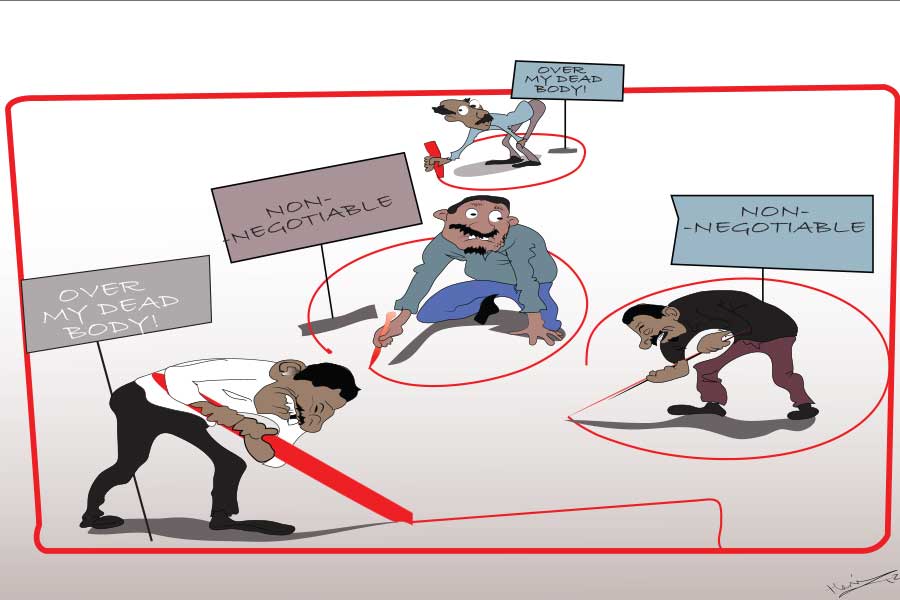
Fortune News | May 31,2020
Nov 16 , 2024.
In the realm of public finance, balance sheets speak louder than rhetoric. In such domain, public enterprises are colossal monuments to misplaced confidence, harbouring debts that tower like unscalable peaks with implications rippling across generations. However, the illusion of their profitability persists despite the glaring red ink saturating their financial statements.
Interestingly, it is not unusual to see Ethiopian leaders' grand economic ambitions colliding with such reality. Take the state-owned enterprises (SOEs), once heralded as the engines propelling the country's growth. They are reeling under the weight of binding debt, judging by the latest quarterly report from the National Bank of Ethiopia (NBE), which paints a grim picture. Public sector debt has soared to over 63.8pc of GDP, which should alarm policymakers.
Debt servicing now consumes over 40pc of state revenues, siphoning funds from vital sectors like healthcare, education, and job creation.
The Birr's depreciation against the Dollar by over 110pc since it was floated in July this year has not helped to assuage the growing anxiety in the power corridors. The currency's sharp plunge inflated the cost of servicing foreign-denominated debts. The once-celebrated expansion of infrastructure and services, driven mainly by aggressive borrowing, has become a fiscal dilemma. The ambitious projects meant to catapult Ethiopia into middle-income status, instead, have led to unsustainable financial strain.
The Ethiopian Electric Power (EEP) embodies this predicament. Entrusted with transforming Ethiopia into an energy powerhouse, EEP is saddled with over 191.79 billion Br in debt, much of it tied to monumental projects like the Grand Ethiopian Renaissance Dam (GERD). While GERD holds the promise of affordable and sustainable energy that could revolutionise regional trade, delays and cost overruns have undermined progress.
EEP faces the daunting task of servicing its debt despite negative cash flows. Each passing quarter tightens the fiscal straitjacket, turning Ethiopia's energy aspirations into a high-stakes bet with potentially severe repercussions for public finances.
Inflation adds another layer of complexity. Although it averaged 14pc recently, down from 33pc in 2022, monetary policy limitations constrain the federal government's attempts to tighten spending. Reliance on domestic financing to bridge budgetary gaps has only heightened borrowing costs, as inflationary pressures push rates higher. This crowds out the private sector, which competes with the state for capital access, stalling growth in critical industries.
A dangerous feedback loop emerges where debt fuels inflation, which in turn begets more debt. It is a spiral that, if left unchecked, could culminate in a full-blown crisis.
The gravity of the situation prompted the government to place a bet on future economic stability. This month, a bill was submitted to federal legislatures to absorb the debt amassed by struggling public enterprises by authorising a 900 billion Br government bond, the largest in the country's history. Its purpose appears to be twofold. Its authors seem to want to wipe out the defaulted loans of state enterprises that have become financial albatrosses and to beef up the capital of the Commercial Bank of Ethiopia (CBE), whose balance sheet has been strained by these underperforming enterprises.
While evidently designed to preserve economic stability, this followed an agreement with the IMF to address the deepening public debt issues, demonstrating the government's commitment to genuine reform. However, this manoeuvre should raise profound concerns about fiscal health and long-term financial discipline. The risks inherent in absorbing such debt through bonds demand cautious scrutiny.
Economists often question the nature of government bonds as net wealth, arguing that public debt might not be the wealth it is perceived to be, especially when offset by future tax liabilities. The analogy holds for public enterprises whose apparent assets are liabilities in disguise. Each Birr funnelled into these ventures translates to increased future obligations, eroding private sector confidence and investment.
The societal cost would be monumental. Taxes would rise, growth would slow, and innovation would stall. Every Birr diverted to service the debt of a bloated public enterprise would be a missed opportunity to invest in infrastructure essential for economic dynamism. The irony is that citizens relying on these enterprises bear the brunt of their inefficiencies through higher taxes and diminished public spending.
At the core of the bill tabled for Parliament is the transfer of debt accrued by six large public enterprises to the state, effectively transforming a substantial portion of their outstanding obligations into government debt. The Ethiopian Sugar Corporation, for instance, owes the CBE an alarming 101 billion Br. Collectively, with the EEP, these enterprises owe over 400 billion Br, a figure that has threatened the CBE's financial position. With public debt-to-GDP already near its sustainable limit, transferring 846 billion Br in bad loans to the state should set off alarm bells.
For years, state enterprises borrowed aggressively to fund development initiatives, particularly in infrastructure. Ironically, the ambitious strategies have not yielded the expected returns. Instead of generating sustainable profits, many of them have amassed debts they cannot repay.
Between 2012 and 2023, state enterprises' debt-to-GDP ratio swelled to nearly 30pc. Years of reckless borrowing and spending, driven by an obsession with large-scale projects, have weakened balance sheets and undermined fiscal health. By June 2023, public and publicly guaranteed debt was already 40.8pc of GDP, up by 9.8pc from the previous year. Writing off state enterprises' debt would exacerbate these pressures, pushing debt levels toward unsustainable highs.
The bill to issue bonds to "wipe the slate clean" for these enterprises risks setting a dangerous precedent. It could lead to an endless cycle of debt accumulation and bailouts, particularly in an environment lacking robust regulatory oversight and financial accountability.
The sheer scale of the debt being absorbed should be sobering. It is set to be repaid over 10 years following a three-year grace period. The terms of the bond defer the principal repayment, effectively pushing the problem into the future. The fiscal deficit is already a concern, with external debt servicing consuming nearly 30pc of export earnings. Adding additional obligations risks deepening the deficit, potentially leading to higher inflation, tighter monetary conditions, and increased borrowing costs.
While tempting in the short term, especially under pressure to relieve the treasury, issuing massive bonds would be neither sustainable nor prudent. Writing off these debts would sidestep the real issue, treating the symptoms - the inability of public enterprises to repay debt - rather than addressing the root causes of chronic underperformance. Eliminating debts without systemic reforms lays the groundwork for future crises, signalling that state-backed enterprises can overborrow without consequence.
The government's decision to absorb this massive debt into the state balance sheet will have lasting implications. By taking on the debt of public enterprises without addressing the underlying causes of their financial failures, Prime Minister Abiy Ahmed's (PhD) administration risks perpetuating a cycle of reckless borrowing and bailouts that could prove disastrous.
History offers cautionary tales.
Argentina's persistent bailouts and debt transfers eventually crippled its economy, leading to soaring inflation and austerity measures. Ghana's similar debt absorption led to a vicious cycle of rising debt and public discontent. Kenya's rising public debt, now over 70pc of GDP, has triggered public rage and austerity measures that led to a deadly crackdown on protests.
To avoid a similar fate, Ethiopia's leaders need to develop a comprehensive overhaul of debt management strategy, focusing on holding public enterprises responsible and ensuring future debt issuances are backed by sound financial practices. Absorbing unsustainable debt without implementing meaningful reforms merely shifts the burden onto taxpayers. Policymakers should prioritise restructuring or privatising non-performing enterprises. Divesting from inefficient state enterprises could generate revenues to retire debt, reducing financial liabilities.
In an economy where resources are scarce, the opportunity cost of these bonds would be substantial. Every Birr spent repaying public enterprises' debt is one not invested in essential public services. The bond issuance will likely exert upward pressure on interest rates, raising borrowing costs for private enterprises and individuals and potentially stifling economic growth.
Federal legislatures now face a consequential decision to make.
Stabilising the CBE and clearing public enterprise debt might seem to offer immediate relief. But, they need to weigh the long-term consequences of absorbing debt without meaningful reforms. They could demand transparency, oversight, and fiscal responsibility, which are imperative. They should realise that writing off debts offers, at best, a temporary reprieve, a sedative masking deeper structural crises. Lawmakers should question the administration’s prioritising short-term stability over long-term sustainability.
Passing the bill without additional measures to reform state enterprises and establish stricter borrowing limits could set a precedent for future bailouts, creating a vicious cycle of debt that threatens economic stability.
PUBLISHED ON
Nov 16,2024 [ VOL
25 , NO
1281]

Fortune News | May 31,2020

Fortune News | Aug 22,2020

Fortune News | Jan 05,2019

View From Arada | Jan 31,2021

Viewpoints | Feb 27,2021

Radar | Aug 21,2021

My Opinion | Jun 29,2019

Editorial | Jan 04,2020

Fortune News | Sep 21,2025

Commentaries | Nov 23,2024

Photo Gallery | 173885 Views | May 06,2019

Photo Gallery | 164113 Views | Apr 26,2019

Photo Gallery | 154191 Views | Oct 06,2021

My Opinion | 136590 Views | Aug 14,2021

Dec 22 , 2024 . By TIZITA SHEWAFERAW
Charged with transforming colossal state-owned enterprises into modern and competitiv...

Aug 18 , 2024 . By AKSAH ITALO
Although predictable Yonas Zerihun's job in the ride-hailing service is not immune to...

Jul 28 , 2024 . By TIZITA SHEWAFERAW
Unhabitual, perhaps too many, Samuel Gebreyohannes, 38, used to occasionally enjoy a couple of beers at breakfast. However, he recently swit...

Jul 13 , 2024 . By AKSAH ITALO
Investors who rely on tractors, trucks, and field vehicles for commuting, transporting commodities, and f...

Oct 12 , 2025
Tomato prices in Addis Abeba have surged to unprecedented levels, with retail stands charging between 85 Br and 140 Br a kilo, nearly triple...

Oct 12 , 2025 . By BEZAWIT HULUAGER
A sweeping change in the vehicle licensing system has tilted the scales in favour of electric vehicle (EV...

Oct 12 , 2025 . By NAHOM AYELE
A simmering dispute between the legal profession and the federal government is nearing a breaking point,...

Oct 12 , 2025 . By NAHOM AYELE
A violent storm that ripped through the flower belt of Bishoftu (Debreziet), 45Km east of the capital, in...